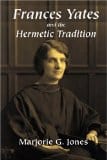
Frances Yates and the Hermetic Tradition
, by Marjorie G. Jones
Ibis Press, 9780892541331, 262 pp. (incl. end notes, bibliography and index), 2008
Frances Yates and the Hermetic Tradition is the first full-length biography of Frances Yates, who was among the first wave of late Victorian female historians. Notes were compiled for an autobiography, but it remained incomplete at her death, though she did leave instructions for future biographers.1
The account of Yates’ early years are taken in part from the unfinished autobiography, and the journal her father kept about her growth and progress from birth to a young child, with notes on her character and conduct.
Jones traces her personal and scholastic interests through her published books and essays, correspondence, early versions of her works and their notes, and her journals, and the black and white plates reproduced here offer additional insight into her home and professional life.
Citing examples of other women historians and the reasons they may have undertaken studies of the Renaissance and more modern cultures, Jones writes:
For women, another reason for the attraction may have been a lack of training in Greek and Latin, which were prerequisites for university students and the study of Classical civilization. More than likely, female scholars who, like Yates, were tutored at home would have had knowledge only of modern languages such as French and Italian. Thus Renaissance studies were a more comfortable fit for them.2
I was surprised to learn that though Yates was early at work in translating Giordano Bruno’s La Cena de le Ceneri (“The Ash Wednesday Supper”), it took nearly thirty years to “place Bruno in the context of the Hermetic tradition”.3 After the publication of Giordano Bruno and the Hermetic Tradition and The Art of Memory
she moved from relative obscurity to renown, and, later, controversy.
Frequent allusions are made to the lack of formal training Yates received as a historian, but the specifics of these deficiencies are never spelled out. I would have appreciated more commentary on her work with specific examples of its influence and the responses it received to help place Yates’ work in context today, but these are minor criticisms in what is otherwise an excellent biography.
Frances Yates and the Hermetic Tradition may be Yates’ first biography, but I hope it will not be her last. Jones has laid the groundwork for further study into Yates’ life, and it’s an excellent beginning.








